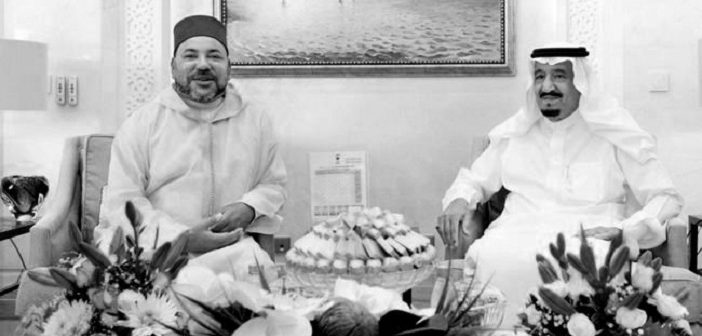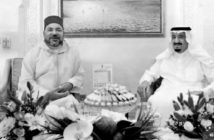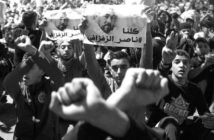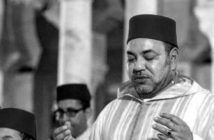Since the fall of the Shah regime in 1979, Tehran and Rabat have relations that have rarely been cordial.
Relations between the two countries have not always been calm, because of the opposition that Morocco has always shown via the Islamic revolution, in addition to the unconditional support that offered at the time the King Hassan II in the Shah of Iran.
The latter was thus able to obtain a right of asylum in Morocco, after being ousted by the revolution. The Shah stayed only a short time in Marrakech; but its reception in Morocco was not accepted by the Khomeini regime, which in retaliation recognized the Polisario (the People’s Liberation Front of Saguia el Hamra and the Rio de Oro, constituted in 1973, first to fight against the Spanish colonization and then to defend the existence of a Saharawi Arab Democratic Republic, the SADR, against the will of Morocco to annex the region).
Relations between the two countries were then completely interrupted for a decade, until the change in the Moroccan political landscape in the 1990s, with the advent of the alternation government, whose main objective was to leave the kingdom of the deep economic crisis that was undermining it. From a pragmatic perspective, the socialist governments have since developed an open diplomacy towards countries formerly classified as non grata, among which was the Islamic Republic of Iran. Relations between Iran and Morocco have then moved towards a degree of standardization, in a climate of stability and active collaboration, in all sectors, particularly in the field of culture, marked by exchanges of university missions, the organization common cultural weeks and the promotion of the artistic achievements of both countries, especially film productions.
Notwithstanding Thaïs unprecedented rapprochement, the good agreement lasted little more than a decade: in 2009, Rabat called in consultation with his charge d’affaires in Tehran, to protest “inappropriate expressions” made by the Iranian leaders after that Morocco proclaimed its support for Bahrain, when Tehran described the small emirate as “the fourteenth province of Iran“. The Moroccan government has also accused Iran of trying to alter the religious foundations of the Malikite kingdom and the authority of the king, by threatening the unity of the Sunni Muslim religion in Morocco, unacceptable interference in the internal affairs of the country, an act totally contrary to the common rules of the conduct of the diplomatic action.
In 2014, a timid return to normality took place, in a framework of agreement of non-interference and mutual respect. In 2018 however, Morocco has decided to sever relations with Iran again.
* * *
On May 1, 2018, the Moroccan state broke off relations with Iran, which is accused of new maneuvers aimed at the territorial integrity of Morocco, through the sending of weapons and military support to the Polisario.
Morocco’s version: intense relations between Lebanese Hezbollah and the Polisario Front
Mostafa Alkhlfi, the spokesman for the government said that “Morocco has irrefutable and overwhelming evidence of the involvement of Hezbollah in sending military instructors to Tindouf [ed.: capital of the SADR, recognized by the African Union, but which is not a member of the UN] and its responsibility in delivering weapons to the Polisario Front.” According to the same communication, Iran through Hezbollah provided the Sahrawi front with ballistic missiles SAM9, SAM11 and Srellas. In addition, among the elements available to Rabat, a member of the embassy of Iran in Algiers would be involved in the operation of Hezbollah: he would have facilitated the delivery of weapons and the visit of Lebanese military cadres to Saharawi military bases
Shortly before the decision to break up, the Minister of Foreign Affairs and Cooperation, Nasser Bourita, had gone to Tehran in search of an explanation, but he could not have obtained “such an irrefutable response” as evidence of interference: in an interview with Fox News, Nasser Bourita says “It is clear that Iran’s interference in the internal affairs of Arab and Muslim countries will not stop in the Middle East, and to the Gulf countries“, repeating several times that Morocco holds the evidence that meetings took place between the leaders of Hezbollah and the leaders of the Saharawi front. These meetings, according to the minister were intended to determine the ways in which the Lebanese party could provide military and logistical training to the militias of Tindouf and Bir Lahlou.
The Moroccan government’s thesis is that Hezbollah sought revenge for the extradition to the United States of Kacem Mohamed Tajeddine; this would be the cause of the turning point that marked the evolution of diplomatic relations with Iran. Kacem Mohamed Tajeddine, a Hezbollah financier, described by the minister as “a man of money who is at the heart of the party’s financing system in Africa and is accused of money laundering“, was arrested in Morocco in March 2017. Hezbollah reportedly threatened the Moroccan government with an order to release him, but he extradited the individual at the request of Washington. It is this extradition that would have constituted the tipping point and caused a major change relation between Morocco and Iran, Hezbollah having undertaken to support the Polisario, a bias designed to respond to the Moroccan decision. Hezbollah has offered its expertise to the Polisario, an opportunity for the Saharawi front, Hezbollah having significant experience in guerrilla techniques, which the Polisario could enjoy one day. Finally, according to Nasser Bourita, these events coincide with the recent intentions of the Polisario “to establish a military presence east of the Moroccan Sahara defense system.”
This explanation put forward by the Moroccan government, which blames Iran’s main ally for the culprit behind the Iran-Morocco diplomatic crisis, has been categorically denounced by Hezbollah and the Iranian government.
The Hezbollah and Iran version: Saudi pressure and interferences…
In response to Morocco’s accusations against his movement Hassan Nasrallah, Hezbollah’s secretary-general, said the whole story was pure fabrication intended to justify Morocco’s decision to break ties with Iran for reasons.
It is obvious that Morocco has chosen Saudi Arabia’s camp and is therefore involved in the conflict ravaging Yemen. He denied any ties of his party to the Saharawi front, saying that Rabat was unable to substantiate his allegations with material evidence, as the Moroccan minister merely stated names of people close to Hezbollah and Iran, names that would have been “provided by Israel“. Hassan Nasrallah finally insisted on Hezbollah’s neutral stance on the Sahara issue.
Thus, the rupture of the Iran-Morocco relations would be, according to the leader of Hezbollah, the result of the only will of the Moroccan government to “satisfy a third party“. Words strongly supported by the Iranian government, the spokesman of the Iranian Foreign Ministry, Bharam Kassimi said: “The Moroccan Minister of Foreign Affairs knows full well that his allegations are totally false and based on fantasies written by those who make such provocations at the service of their illegitimate interests and do not care about the real interests of the Moroccan people.” The Iranian minister insisted on the importance that his country attaches to the national security of the other states and he added in this same spirit, “to hope that the recent decision of Morocco was not taken in the framework of new regional alignment“…
More explicitly, Bharam Kassimi went on to express his fear “that pressure has been exerted on Morocco by certain forces, with the aim of encircling the Islamic Republic of Iran” which according to him, “stands as a bulwark. against the enemies of Islam and is a staunch supporter of the first cause of Muslims, namely the question of Al-Quds [Jerusalem]”, thus directly referring to the recent rapprochement between Riyadh and Tel Aviv. “The Muslim world is now more than ever in need of unity and integrity, especially after Trump’s decision to transfer the US Embassy from Tel Aviv to Al Quds, he said; and the unfortunate Marocain initiative Willy Orly promote the objectives of the enemies of the Muslim world and divert attention from the most pressing issue of our world aggression against the holy city.”
Taking advantage of the Moroccan crisis to extol its vigilant policies towards Westerners and their Arab allies, Iran once again positioned itself as the guardian of the Muslim World, calling on Muslim countries to support solidarity and recommending them. to rely only on their own abilities and the unity of the Ummah [ed.: the “community of believers”].
A political projection on the map of the world and the affirmation of a global strategic vision, the “pax islamica”, which should not make forget the Iranian intentions to extend a hegemony on the Middle East and North Africa (MENA – Middle East and North Africa); just as in Lebanon, for example Iran does not hesitate to interfere in the internal affairs of other states.
Moroccan strategic dumpling?
In the era of globalization, the break is a policy that must be avoided, as we must avoid any tension that could lead to it.
In fact, the aim of diplomacy is to defend interests, and it can be used to transform enemies into good allies. It is a practice that requires great statesmen, who know how to set the rules over the game, who master this art, who know how to play the game using complex diplomatic problem-solving techniques, which are just equations of a science that not just anyone can implement.
Probably the elements produced by Morocco are sufficient to attest to Iranian interference and the involvement of Lebanese Hezbollah in strengthening the Polisario. But probably the real cause of the diplomatic break unilaterally decided by Morocco has more to do with Saudi politics than it does Western Sahara.
However, to challenge the Persian giant is to be forced to constantly renewed companies. Vengeance is a historical tradition among the Persians; it is calculated and always implemented by subtle reasoning: in the Moroccan case of course, there is only the problem of the Sahara, a major political priority for the Cherifian kingdom that could serve this purpose.
Rabat has gotten hold of an important personality for Shiites in Africa; even worse, Morocco extradited him to Washington. The measure may please Americans, especially at a time when Donald Trump wants to get out of the nuclear deal with Iran. But in the long run, this strategy will show its weaknesses, especially as the policies change in the White House, and not at all among the Persians when it comes to protecting its allies.
The same is true of Morocco’s unconditional alliance with Saudi Arabia and its participation in the war in Yemen, in the coalition of Sunni countries led by Riyadh.
It may appear to the Moroccan government that it killed two birds with one stone. He has in fact committed a blunder, or even a serious strategic mistake. A fortiori years a changing environment or at least uncertain as is the Middle East today, a government must have the art of choosing opportunely its options, whatever the threat indirect or direct, which weighs on his interests and that drives him to go on the offensive. Political leaders must work in the long term, so that their action cannot be due to a useless project whose immediacy ruins the whole task of strategic planning.
What are Moroccan interests in the long term? There is a chain of causes and effects that should not be ignored. The daring of the Moroccan enterprise and its categorical rallying with Washington and Riyadh (and indirectly with Israel) will positively affect without a doubt, if not the military arsenal of the Saharawi front, at least its combat capabilities in the manner of those (Hezbollah) who defeated in 2006 the strongest army in the region.
Dead body for some, pleasure for others … What is bad for Morocco is surely good for the Polisario, who will take the opportunity to make up for what still escapes him in the Military domain. Its militias need such know-how, which will trigger a change in their military practice, both qualitatively and quantitatively.
If there was no support before the break (or if the information at the disposal of Morocco are false), the rupture then paved the way for an unprecedented rapprochement, between two camps whose political doctrines are different but whose interests can cross at one point.
Therefore, thanks to the radical attitude of the Moroccan government, Iran will have a say in the Arab Maghreb.
The Persians’ entry into force in this region will threaten more than one state, their strategies of indoctrination being the most convincing, as decisive as they are effective.
That said, a return to cooperation is necessary and possible, by correcting the unforeseen, according to the rules that prevail in the field of diplomacy.
* * *
Cooperation certainly has effects on nations; it establishes the necessary dialogue between countries that are hostile.
It is of course out of the question for Morocco to negotiate at the risk of losing its soul; yet with diplomacy, he can turn the enemy into a mere adversary. A simple consultation is enough to recognize the right of everyone to equal security: peaceful coexistence is obviously the first degree of cooperation between two potentially rival nations.
“The enemy” is not only the one we fight and with whom we break relationships; he is also the one with whom we will negotiate and make peace.





